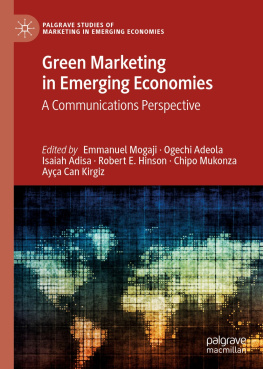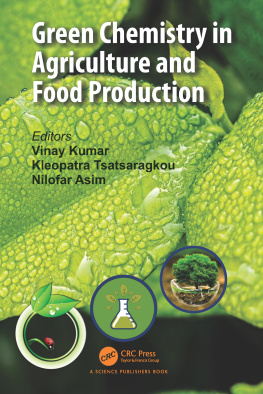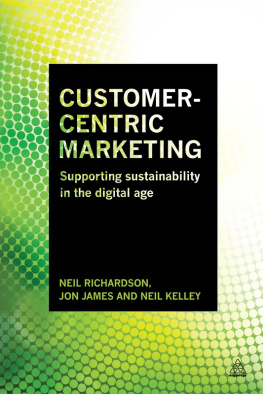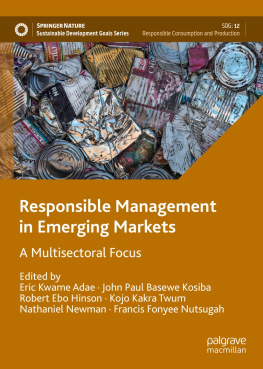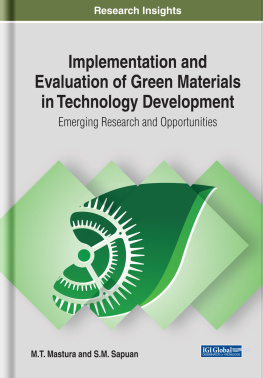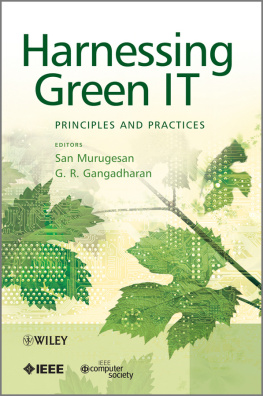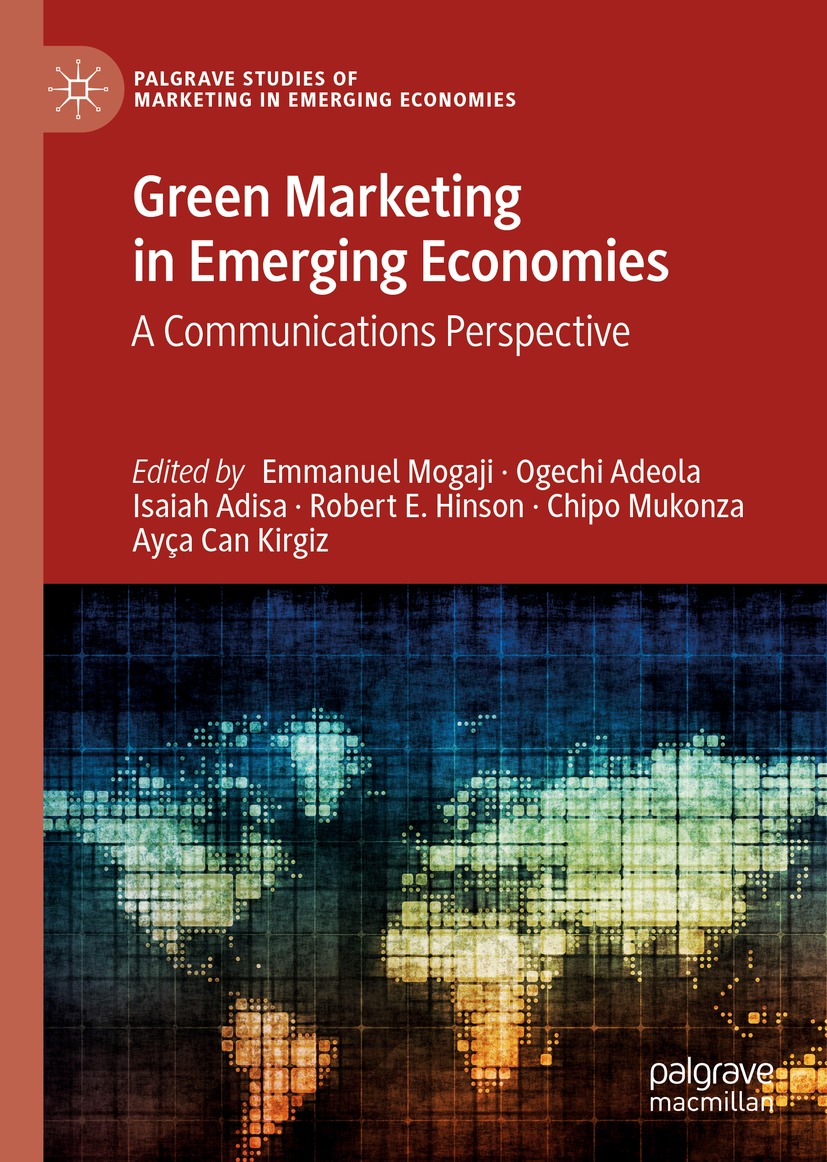Palgrave Studies of Marketing in Emerging Economies
Series Editors
Robert E. Hinson
Department of Marketing and Entrepreneurship, University of Ghana Business School, Accra, Ghana
Ogechi Adeola
Lagos Business School, Pan-Atlantic University, Lagos, Nigeria
This book series focuses on contemporary themes in marketing and marketing management research in emerging markets and developing economies. Books in the series cover the BRICS (Brazil, Russia, India, China and South Africa), MINT (Mexico, Indonesia, Nigeria and Turkey), CIVETS (Colombia, Indonesia, Vietnam, Egypt, Turkey, and South Africa); EAGLE economies (those which are expected to lead growth in the next ten years, such as Brazil, China, India, Indonesia, South Korea, Mexico, Russia, Taiwan, and Turkey) and all other African countries (classified under developing countries), taking into consideration the demographic, socio-cultural and macro-economic factors influencing consumer choices in these markets. The series synthesizes key subject areas in marketing, discuss marketing issues, processes, procedures and strategies across communities, regions and continents, and also the way digital innovation is changing the business landscape in emerging economies.
Palgrave Studies of Marketing in Emerging Economies presents a unique opportunity to examine and discuss marketing strategy and its implications in emerging economies, thereby filling a gap in current marketing literature.
All chapter submissions to the series will undergo a double blind peer review and all book proposals will undergo a single blind peer review.
More information about this series at http://www.palgrave.com/gp/series/16591
Editors
Emmanuel Mogaji , Ogechi Adeola , Isaiah Adisa , Robert E. Hinson , Chipo Mukonza and Aya Can Kirgiz
Green Marketing in Emerging Economies
A Communications Perspective

Logo of the publisher
Editors
Emmanuel Mogaji
Department of Marketing, Events and Tourism, University of Greenwich, London, UK
Ogechi Adeola
Lagos Business School Pan-Atlantic University, Lagos, Nigeria
Isaiah Adisa
Olabisi Onabanjo University, Ago-Iwoye, Nigeria
Robert E. Hinson
Department of Marketing and Entrepreneurship, University of Ghana Business School, Accra, Ghana
Chipo Mukonza
Tshwane University of Technology, Polokwane, South Africa
Aya Can Kirgiz
Istanbul Kent University, Istanbul, Turkey
ISSN 2730-5554 e-ISSN 2730-5562
Palgrave Studies of Marketing in Emerging Economies
ISBN 978-3-030-82571-3 e-ISBN 978-3-030-82572-0
https://doi.org/10.1007/978-3-030-82572-0
The Editor(s) (if applicable) and The Author(s), under exclusive license to Springer Nature Switzerland AG 2022
This work is subject to copyright. All rights are solely and exclusively licensed by the Publisher, whether the whole or part of the material is concerned, specifically the rights of translation, reprinting, reuse of illustrations, recitation, broadcasting, reproduction on microfilms or in any other physical way, and transmission or information storage and retrieval, electronic adaptation, computer software, or by similar or dissimilar methodology now known or hereafter developed.
The use of general descriptive names, registered names, trademarks, service marks, etc. in this publication does not imply, even in the absence of a specific statement, that such names are exempt from the relevant protective laws and regulations and therefore free for general use.
The publisher, the authors and the editors are safe to assume that the advice and information in this book are believed to be true and accurate at the date of publication. Neither the publisher nor the authors or the editors give a warranty, expressed or implied, with respect to the material contained herein or for any errors or omissions that may have been made. The publisher remains neutral with regard to jurisdictional claims in published maps and institutional affiliations.
Cover illustration: Zoonar GmbH / Alamy Stock Photo
This Palgrave Macmillan imprint is published by the registered company Springer Nature Switzerland AG
The registered company address is: Gewerbestrasse 11, 6330 Cham, Switzerland
Preface
The literature on green marketing continues to gain traction in the sustainability discourse, focusing on core subject areas such as green product development , green marketing strategy, green operations, green advertising , and profitability. The role of green-focused stakeholders is gathering momentum, too, and emphasis has been placed on the consumers due to their impact on business profitability, environmental sustainability , and green social behaviour. Consumers in emerging economies contribute significantly to the survival of businesses despite social, economic, and infrastructural challenges. For businesses in emerging economies, the strategic focus is to understand the consumers and their unique needs, and leverage opportunities, including their increasing desire for a greener economy, to gain a competitive advantage. Achieving green marketing success in emerging markets encompasses influencing, orientating, and communicating the green offerings of an organisation to the consumers. In this book, contributors argue that positioning an organisation as a green brand and appropriately communicating its green offerings through marketing shape consumers green adoption, behaviour, and practices. The book highlights the goals of green marketing, such as influencing consumers green adoption, behaviour, and attitude towards sustainability practices and, at the same time, profitability for companies.
Green branding and communications practices in emerging economies are the core focus of this book, and themes such as green integrated marketing communications , greenwashing , consumer scepticism, and consumer response to green marketing communications are explored. Green communication in the tourism and hospitality industry in emerging economies was also discussed. Emphasis was placed on branding with themes such as green brand implementation, green brand equity, and nation-branding through environmentalist political communication . A theoretical framework for green marketing communication on consumer behaviour in emerging economies was also developed. The books propositions and suggestions contribute to theoretical and practical knowledge of green marketing in emerging economies. It extends the domain of knowledge on how consumers can be influenced to adopt sustainable consumption and lifestyle in emerging economies.
This book offers benefits to both academics and practitioners. Researchers and students interested in marketing and sustainability initiatives are provided with a valuable book to enrich their understanding of green marketing communication and branding . Finally, marketing managers and brand consultants are presented with a text on how to effectively communicate green offerings while positioning an organisation as a green brand towards influencing consumers green purchasing behaviour.
Emmanuel Mogaji
Ogechi Adeola

